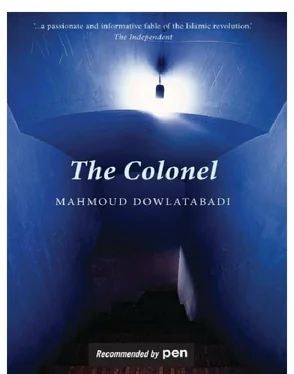Khezr Javid was sitting on the bed, smoking. He had got some colour back into his cheeks. Amir was beginning to understand that he was not as brave as he made himself out to be. His courage was the courage of men who know they have got the backing of a system behind them. Amir sat down, without drawing attention to the upside down turn of the events happening outside. Khezr was too clever to be easily led up the garden path, but he had not faced up to the facts of the situation. He either couldn’t, or wouldn’t face it. Stubbing out his cigarette, he simply remarked:
“I’ve put you in a bit of a spot, haven’t I?”
“No, no, not at all.”
“You know, If I had passed into officer training school, things might have turned out very differently, but I failed. I’ve no regrets. I’m not going to whine like a child the others won’t play with.”
“You still think you have a future, then?”
“I can see my future very clearly, rather more clearly than you can, with your crazy distorted view of life.”
Amir heard Mohammad-Taqi and Abdullah Kolahi going back down the verandah steps and hurrying to the main gate. Their footsteps were fast and light; Amir guessed they must be wearing trainers. He could take no more of it and ran up the stairs, just in time to see them going out into the alleyway with the boxes of medicines and bandages that Parvaneh had made. She peered out of the half-open gate and watched them go, then closed it and headed back to her room. Before she came in, Amir slipped down to the basement, closed the door softly behind him and waited until he was sure that his sister had gone upstairs. Then he went and sat down again. Khezr Javid was still lying there, with his arm over his forehead and his eyes closed. Sarcasm had got the better of him:
“So, the lads are out doing their bit for the movement, are they?” Then, as if talking to himself: “I suppose I shall just have to go out and sort something out with them in the morning.”
Two shots, one after the other. Amir’s heart missed a beat, and he forgot what he was going to say to Khezr. Khezr did not press him but instead, as if a great calm had come over him, began to snore loudly. As one eye was half-open, Amir assumed that he had gone to sleep, and lit himself a cigarette.
I know Khezr hadn’t want Mohammad-Taqi to open the door to him, but he had, and I could have done something about it. Khezr is deeply worried, I know, but he won’t face it. I know that Khezr is not unhappy that I went up and spoke to Mohammad-Taqi, and I’m damn sure Khezr is well aware of what Mohammad-Taqi thinks of him. I did my best not to let things get out of hand with Mohammad-Taqi and end in a fight, and they didn’t, but it was only about him letting Khezr stay just for one night, and not for ever. I tried to go straight back down to Khezr, which I did, and he didn’t say a word directly about what had happened, but… I’m still worried. I’m worried about my brothers, and I could see the same worry in the colonel’s eyes. Mohammad-Taqi has gone out, if only to take Abdullah home. Little Kuchik is still out there and, according to Abdullah, the trouble has spread beyond the city, out into the forest.
I was in a cold sweat. My eyelids felt like dried bricks rubbing together. One cigarette, then another…
Just as the morning call to prayer was called, I heard someone at the gate. I slipped out, dodging the watchful half-open eye of Khezr Javid, and went upstairs. Mohammad-Taqi was in the courtyard, squatting by the pond and washing his hands and face to freshen up after his long night. What on earth had he been getting up to all that time?
“Where’s little Kuchik? Did he spend all night at the mosque? Why hasn’t he come home?
“He’s just fine.”
“I was worried.”
“It came off all right this time.”
And with that, Mohammad-Taqi got up and went up the verandah steps. Amir thought he might as well have a wash too. He sat down on the edge of the pool and sluiced the grime and tiredness of the night off his face. But he was still worried. He waited to see what Mohammad-Taqi was going to do. He felt in his bones that his brother was not going to stay in. And nor did he. A minute later, he came back out on the verandah with a bag slung over his shoulder. Amir wanted to ask him if he was going out by himself or with someone else, then realised there could be no more pointless a question. So he kept quiet, waiting for Mohammad-Taqi to come down the steps towards the gate. He could feel his heart beating, worrying that, in his huff, Mohammad-Taqi might leave without a word, without even saying goodbye. But Mohammad-Taqi reined in his bad temper. Stopping by the gate, he turned round and, as if not knowing why, stroked his index finger over his thin, golden moustache and looked at Amir:
“Forgive me, but I am not setting foot in this house again as long as there’s a policeman in it. Parvaneh’s asleep. Say goodbye for me to her, and to Father and little Kuchik.”
Amir had no answer to that, and Mohammad-Taqi did not expect one. As he went out, he braced his foot against the wall to do up the laces of one of his trainers, which must have been loose. Amir stood there until his brother had gone and then turned round to go back inside. As he did so, he caught sight of the colonel, who had been watching Mohammad-Taqi’s departure through the window.
My son… my son… oh, my children…
Amir could not meet his father’s gaze, and carried on down the steps to the cellar. Khezr opened the door in his face before he reached it. He was astonished to see that Khezr was all ready to go out and was just bending over to do his shoe up.
“What about some breakfast?”
Khezr did not answer. Amir could hardly ask him where he was off to at this hour of the morning so, like a lizard, he darted after him into the yard, as far as the gate. As he opened it, he remembered that Khezr had left his walking-stick behind.
“Your stick, Doctor.”
Khezr did not answer, but just muttered something about being back soon. Amir shut the gate after him, but it was a while before he was conscious of having done so. As the sound penetrated to his brain, he felt as if he had been shot. Everything went black…
Why has he gone out straight after Mohammad-Taqi?
Amir was overwhelmed by a dreadful sense of foreboding. He felt that he was losing his mind. This was worse than any of his nightmares.
My children, oh my poor children…
He had no idea how long he stayed there behind the gate, in the rain, endlessly turning over in his mind the last thing that Khezr had said to him: ‘I suppose I shall just have to go and sort something out with them in the morning.’ The words ‘sort something out’ hammered over and over again in his head, but he was unable — or maybe he just did not have the courage — to grasp the ominous meaning behind the words. Only now was it beginning to dawn on him how much he detested both himself and Khezr Javid. In his mind he saw only his own wretched, morbid self and the savage visage of Khezr Javid during those terrifying interrogations in the small hours of the night. Grilling after grilling, and that damned bloodstained knife …
And he also felt ashamed at the sight of the colonel, who was still standing there by his sitting room window, just where he himself had been standing, watching the colonel crossing the courtyard having killed his mother and standing in the pouring rain with his bloodied sword, shouting: ‘I’ve killed her! I’ve killed her at last!’
He dared not look up to meet the colonel’s eyes. Parvaneh’s canary was going berserk: its trilling had turned into one long scream. It just would not shut up. A thousand nightmares were wheeling inside Amir’s brain now, all hammering at him the same thing: that Mohammad-Taqi would not be coming home alive.
Читать дальше












